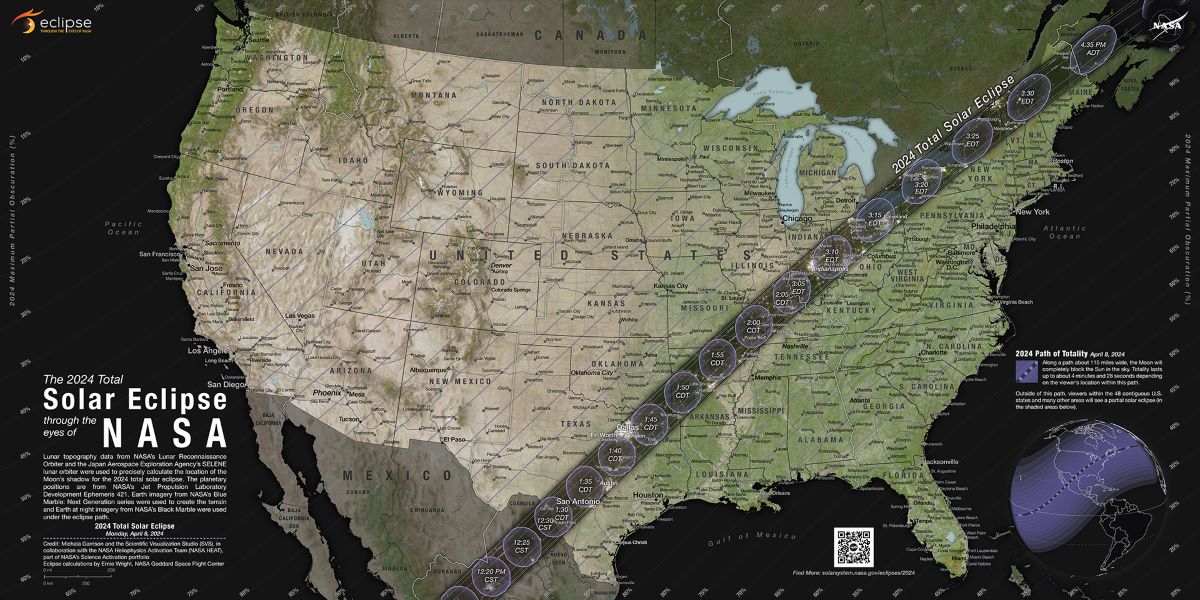April 8 will bring the first total solar eclipse since 2017 to cross the continental United States, pasing close enough to Delaware that we will experience it as a partial eclipse.
That’s because the First State is outside of the “path of totality” — the areas that will fall fully under the shadow of the eclipse, for anywhere from a few seconds to a few minutes. Delaware is east of this path, which will cross the US from central-south Texas to the top of Maine, just north of Pittsburgh.
Delaware will experience a partial eclipse of about 86% to 88% obscuration; if you hope to see totality, or the complete blocking out of the sun with the “ring of fire” visible, you’ll have to travel west to the shadow’s path.

The right viewing conditions
It’s often assumed that optimal eclipse viewing means finding a place outside of the city with as little light pollution as possible, but, as Sally Dodson-Robinson, an associate professor of physics and astronomy at the University of Delaware recently told Technical.ly, it doesn’t matter in the case of a solar eclipse.
“Basically everywhere along the I-95 corridor has a really bright sky, so it’s not that great for amateur astronomy,” Dodson-Robinson said. “But for looking at the sun, basically anywhere that you can see the sun is fine.”
The enemy of eclipse viewing is not light, but obstructions, including clouds.
No matter what, you’ll need solar safe eye protection to watch the eclipse. Unlike the total eclipse, where you can remove eye protection during totality, you must use eye protection for the entire duration of a partial solar eclipse. Read more about eclipse eye (and smartphone) protection.
Long-range forecasters are predicting the possibility of clouds on the East Coast on April 8, but there won’t be anything approaching accurate cloud prediction until the day itself, when you can use a weather app to try and find a clear spot.
Traveling to totality
If you decide to jump in a car and go to the nearest place where you can experience the full eclipse, expect to drive for about six hours at least. A total solar eclipse is a big deal that will come with a lot of traffic and booked up hotels.
If you’re up for the adventure, some of the closest places in the path of totality include:
- Titusville, PA (5 hours 44 minutes from Wilmington in regular traffic)
- Carlton, PA (5:50)
- Greenville, PA (5:58)
- Conneaut Lake, PA (5:59)
- Meadville, PA (6:00)
- Union City, PA (6:11)
- Erie, PA (6:32)
The closer to Delaware, the closer to the edge of the path and the shorter the duration of totality. Erie, which is expected to have about 3 minutes and 40 seconds of totality, has an Eclipse 2024 resource page that has just about anything you’ll need to know about traveling to the area for the event.
Watching the partial eclipse close to home
In Delaware, where only a partial eclipse will be visible, it will cross the state between 2:06 p.m. at the southeastern border and end at 4:34 p.m. along the northeastern border.
More specifically:
- Dover will have 86% obscuration at 3:22 p.m.
- Rehoboth will have 84% obscuration at 3:23 p.m.
- Wilmington will have 88% obscuration at 3:23 p.m.
While there is no need to go someplace remote to get a better view, a partial eclipse is a good excuse to get outdoors. If you’re looking to experience the eclipse around other people, you’ll likely find people eclipse-ing at most any public outdoor space that isn’t overly wooded, such as:
- The Beaches
- Delaware State Parks
- The Wilmington Riverfront
- Battery Park in New Castle
- Delaware City Harbor
- Silver Lake Park in Dover
- Main Street Newark/University of Delaware
- Winterthur
- Rockwood Park
If you’re looking for an organized viewing party, your best bet is The Delaware Museum of Nature & Science Solar Eclipse Viewing Party (formerly the Delaware Museum of Natural History on Kennett Pike near Wilmington). Tickets are required, and include general admission to the museum.
Want to learn more and check out some cool interactive eclipse tools? Check out the NASA Eclipses site, and visit Delaware Libraries’ online Solar Eclipse LibGuide.






